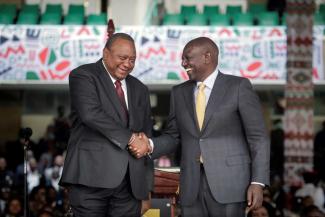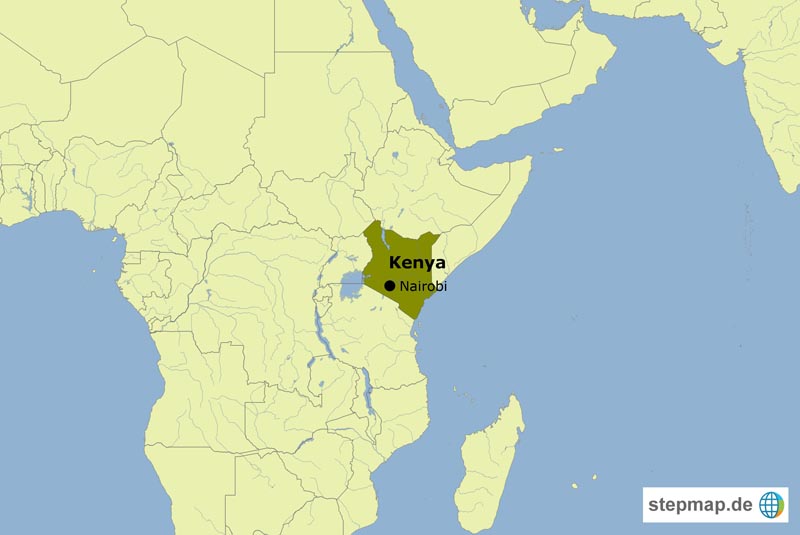Government revenues
Kenya’s new president wants to collect more tax money

When Kenya’s new President William Ruto addressed the country’s Parliament after taking office in September, he did something unusual. Typically, presidential speeches in Kenya focus on how the government will spend money. Instead, Ruto told legislators that he plans to collect more taxes.
The national budget is indeed over-stretched. More than half of the national revenues go to paying back the colossal public debt. In the past decade under President Uhuru Kenyatta, the country’s debt increased four-fold, not least due to ambitious infrastructure projects. Ruto is not entirely blameless, since he served as Kenyatta’s deputy president.
External shocks have made matters worse. They include the impacts of Covid-19, food and fertiliser shortage due to Russia’s invasion of Ukraine, high oil prices, persistent drought in Kenya’s north and the locust invasion in 2020.
The government obviously needs more money and must therefore generate more revenues. The groundwork for the new tax policy and related forms was actually laid by the Treasury in the summer, before Ruto became the head of state. He has proudly adopted the policy.
What he told legislators must have pleased the embassies of high-income countries. After all, donor countries have a long history of demanding that developing countries should “mobilise domestic resources” (see Stefanie Rauscher on www.dandc.eu).
Catching up with donor governments
Indeed, Ruto’s elaborations showed that he wants Kenya to become more like high-income countries in regard to taxation. He stated several ambitions:
- The rich need to pay more taxes.
- Taxation must become equitable, efficient and customer-friendly.
- Kenya has to net more money from wealth, consumption and incomes, rather than relying heavily on foreign-trade related tax and customs revenues.
- The tax-base must become broader, so more citizens are included.
“The economic principle of equitable taxation requires that the tax burden reflects the ability to pay,” Ruto said. He also insisted that “we are overtaxing trade and under-taxing wealth.”
To achieve the goals, a host of measures will be needed. The greatest challenge is probably to widen the tax base by gradually including more informal workers in the system (see box).
By comparison, it is much easier to change the name of the tax authority from Kenya Revenue Authority to Kenya Revenue Service. This step makes sense because the new name sounds more friendly and can, to some extent, help repair the agency’s reputation of ruthlessness. The Kenyatta administration had weaponised the authority to harass political opponents. This harmful pattern is prevalent in many countries where institutions tend to be weak, and the national administrations feel free to arbitrarily use legal regulations for partisan political purposes. Governance must improve.
Simpler legislation, easier payments
The government wants to make the tax payment process easier. The focus is on simplifying tax laws and procedures as well as setting up more offices, especially outside urban centres. Awareness-raising efforts are underway too.
Another policy adopted by the previous administration will continue. Since January 2021, the tax authority has been running a voluntary tax disclosure programme. Those who retro-actively declare tax liabilities that they failed to pay between July 2015 and June 2020 get full or partial relief on penalties and interest payments.
The new policy anticipates tax disputes and seeks to make the dispute resolution process more credible. In particular, the tax appeals tribunal’s independence has been questioned. The reason is that the head of the tax agency appoints tribunal members in spite of the tax agency being party to disputes. This must change.
All in all, Kenya’s current approach to taxation reflects principles outlined by Adam Smith 250 years ago in his classic book “The wealth of nations”. The policy recognises that everyone should pay taxes according to their ability. The process must be simple, so everyone understands it. Finally, the point of taxation is not to kill the goose that lays golden eggs – taxpayers must keep enough money to create more taxable income in the future.
The need to invest in IT
For good reason, Kenya’s new tax policy proposes more investment in information technology (IT) and continuous IT training of tax administrators. The double goal is to generate revenues from the bustling digital economy and to put a check on cross-border tax avoidance and evasion. Illicit financial flows are a serious international challenge of course (see Ronald Ssegujja Ssekandi on www.dandc.eu).
Kenya’s government deserves some praise for having managed to make internet giants like Amazon, Netflix, Google and Meta pay some taxes. However, the tax agency generally appears frustrated because multinational corporations doing business in Kenya often find ways to avoid taxation. For example, they shift profits abroad and declare them in countries with particularly low tax rates. Too many wealthy individuals move their financial assets to offshore tax havens.
To get a grip on both legal and illegal ways of reducing tax burdens, the government wants to regularly review and update international treaties on taxation. Also, the tax agency will set up a special international unit to:
- keep track of cross-border transactions and transfer prices,
- audit multinational corporations and
- monitor changing international patterns of taxation.
International cooperation
Kenya’s new policy also includes more information sharing with other tax jurisdictions. High-income countries are increasingly doing that to enforce their laws.
Kenya belongs to two, partially overlapping regional organisations, the East African Community (EAC) and the Common Market for Eastern and Southern Africa (COMESA). Most other EAC and COMESA members, however, have weaker taxation systems, and statehood is actually quite fragile in some countries. Info-sharing with them may thus not help much.
Indeed, Kenya plans to tighten border controls, not least by applying modern IT. The goal is not just to stem security threats and organised crime, but also to put a check on smuggling, infiltration of counterfeits as well as the misdeclaration and misclassification of goods.
The president’s rhetoric sounds good, and the new policy makes sense. Implementation, however, will be a huge challenge. External shocks such as extreme weather, market disruptions due to war or yet another health crisis may make things even more difficult.
Alphonce Shiundu is a journalist, editor and fact-checker in Kenya.
Twitter: @Shiundu











